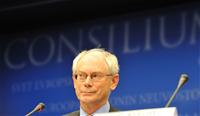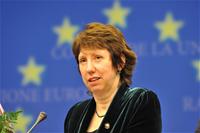Countries like Bulgaria need strong European leadership
Adelina Marini, November 24, 2009
 The international and internal European reactions after the election of Herman van Rompuy as the first president of the EU and of Catherine Ashton as the first foreign minister continue to be negative and to contain the word "disappointment". Most experts, analysts and politicians have commented that the election of unknown and even incompetent people has weakened the EU globally. In an interview for euinside Vesela Cherneva from the Sofia office of the European Council for Foreign Relations said the election of Van Rompuy and Catherine Ashton was not good for countries like Bulgaria because they need stronger European leadership. However, she recommended that we wait and see whether the new high representatives of the EU will prove as professionals:
The international and internal European reactions after the election of Herman van Rompuy as the first president of the EU and of Catherine Ashton as the first foreign minister continue to be negative and to contain the word "disappointment". Most experts, analysts and politicians have commented that the election of unknown and even incompetent people has weakened the EU globally. In an interview for euinside Vesela Cherneva from the Sofia office of the European Council for Foreign Relations said the election of Van Rompuy and Catherine Ashton was not good for countries like Bulgaria because they need stronger European leadership. However, she recommended that we wait and see whether the new high representatives of the EU will prove as professionals:
euinside: What kind of people have been elected for the new posts, envisaged in the Lisbon Treaty - the president and the foreign minister?
VESSELA TCHERNEVA: Two people have been elected who are not quite popular on the European stage, although Ms. Ashton is known on the international stage because of her being for the last several months a Trade Commissioner. In some sense her name is known in remote places like Korea or China, because they deal with EU on trade issues. But, nevertheless, the EU chose two people who do not have much of an experience in what they have to deal with from now on.
euinside: But to what extent does the Lisbon Treaty give an opportunity for renown and strong people to have their own policy or simply the Treaty restricts the new posts by default?
VESSELA TCHERNEVA: The Lisbon Treaty, in a sense, is a more minimalistic document, compared to the Constitution which was the first proposal, brought down in 2005 from the European agenda. Thanks to its more general phrasing, the Lisbon Treaty gives opportunities for stronger figures or people with a profile, well known in international politics, to have their own vision and follow it. The Treaty was exactly this - so that we have single European foreign policy which would be harder, stronger, more flamboyant and, in a sense, more common.
euinside: The US has already reacted with discontent with this election. Maybe the EU has not managed to fill in the expectations for a strong player on the global stage?
VESSELA TCHERNEVA: Most comments, indeed, are in this direction but they come not only from the EU but from inside Europe as well. But in the end of the day, from now on, time will tell. The Lisbon Treaty has created a possibility for us to create a new European reality and, in fact, these two new positions and the people that took them will show in the future whether this is possible.
euinside: In other words, those people were elected to show whether the experiment will prove successful?
VESSELA TCHERNEVA: Yes. We're talking about the beginning of a new European institution like, for example, the European External Service, the common foreign policy and, in a sense, this is a very daring experiment, so we should see whether this experiment is viable itself. Indeed, this is a great challenge. I think that when two people with almost no experience in foreign policy and in the creation of unity in the EU are given this task, they will start realizing much more how big this responsibility actually is. So, I hope that they will rise to the challenge.
euinside: If we take into account the horse trading before their election, could we expect that they will be something like pawns - that they will depend entirely on the interests of the big EU member states?
VESSELA TCHERNEVA: This is the big question and this is the big risk as well. Unfortunately, now it seems as though the big member states prefer to keep their strong positions in making the European foreign policy. In the same time the Commission, to a large extent, will have its own role, entirely political one, the personal role of the new European foreign minister would be very hard to get through and this is the biggest risk.
euinside: Yes, because Herman van Rompuy himself said that his main function would be to  secure compromises. From this point of view wouldn't his lead again to slow decision-making, discussions, etc.?
secure compromises. From this point of view wouldn't his lead again to slow decision-making, discussions, etc.?
VESSELA TCHERNEVA: With regard to the function of Rompuy this, indeed, is the larger part of his role. He has to be there to secure compromise. I would pay more attention to Ms. Ashton - to what extent she will prove to be a person, trying to find the smallest resistance or, maybe, to chose what I consider the sense and the spirit of the Lisbon Treaty - to impose a political vision on EU regarding its partners. In fact, her performance would be the touchstone to what extent these appointments are successful or not.
euinside: If, for example Bulgaria would like to intensify the policy towards the region (the Balkans), she must speak to Lady Ashton, is that right?
VESSELA TCHERNEVA: Look, the EU policy in the region cannot go through bilateral relations only. It needs European vision about what the EU considers right to do with its neighbourhood; moreover. The EU's role as a global player will depend on how the Union deals with its neighbours. In this regard, for all smaller countries it would have been and it is very important to have strong leadership in the EU so that those policies are clear and not challenged.
In other words, if there is a single doubt and arguments within the Union regarding what we should do with the Balkans, for countries like Bulgaria would be very hard to pass any European policy. Bulgaria will lure to emphasize on bilateral relations, which I think is not good for the region because the region needs most of all a European perspective. Of course, it also needs good relations with the neighbours but the European perspective is what can really inspire it to move forward and to make a difference with regard to reforms.
euinside: Since we talked about big member states wishing to keep their role in foreign policy, what is the reason behind this - is it a lack of confidence in smaller and new member states or it's just their own interests they follow?
VESSELA TCHERNEVA: In all member states internal politics plays a major role. Recently this role has increased even further. What public opinion with regard to foreign policy thinks is now more and more important in domestic elections, so the leaders of those countries obviously think that they should have a stronger control over foreign policy. In the long term this is not doing any good to the Union, definitely. But, on the other hand, I think that the leaders of big countries are aware that this is not the long-term strategy. In other words, even Germany or France are not convincing enough on the international stage, compared to a political union of 27 which is united around a single foreign policy.
euinside: Could we expect when the term of Van Rompuy ends in two years and a half, the EU to make something like a correction and try a stronger figure?
VESSELA TCHERNEVA: It depends on the performance of Rompuy. The observers say that he is a very good politician in terms of being good at easily reaching consensus in Belgium, which we well know has no easy political scene at all. So, it might prove that such a person is a good choice for the EU but let's see, two years and a half is not a little time.
 euinside: Lady Ashton will remain a member of the Commission for the whole 5-year term of the new Commission and, actually, the foreign policy of the Union will depend on her?
euinside: Lady Ashton will remain a member of the Commission for the whole 5-year term of the new Commission and, actually, the foreign policy of the Union will depend on her?
VESSELA TCHERNEVA: As far as the member states would allow it.
euinside: When you said that the election was not the greatest idea, I remembered the statement of the Russian president Dmitry Medvedev in Stockholm a short while before the election of Van Rompuy and Catherine Ashton which was very eloquent - it's very good that the Lisbon Treaty will come into force, but anyway Russia will continue to build upon its bilateral relations.
VESSELA TCHERNEVA: This is the long-term game of Russia. Its pursuit to communicate with Berlin, Paris, London and Rome, instead of Brussels, is well known for a long time. In the end of the day it's Russia's interest the EU not to be strong as a community. So, the Russia's policy of "devide and conquer" will continue to be a priority for Moscow. Therefore, given that the common foreign policy towards Russia is the hardest part of the European foreign policy, how the new EU foreign minister is dealing with Russia and how will she position herself on the international stage would be of key importance to see whether we are capable of having common foreign policy at all.